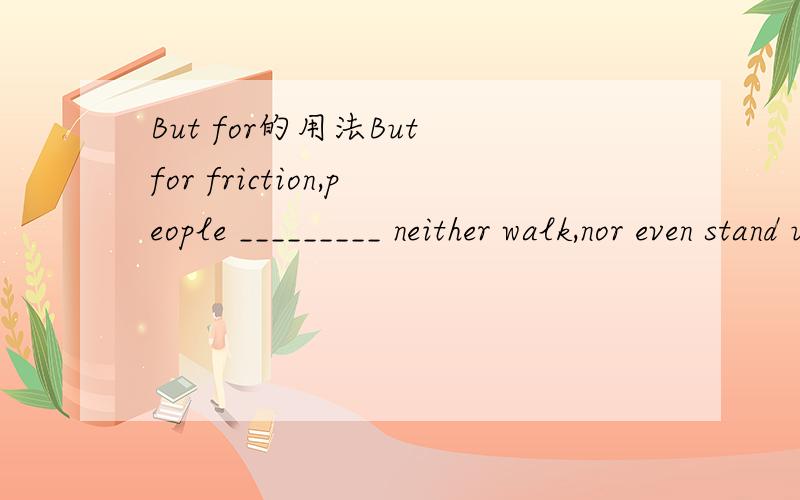But for的用法But for friction,people _________ neither walk,nor even stand up.A) can B) were able to C) will be able D) could这里的but for是隐含了虚拟语气吗?那么它相当于if it have had friction吗?再者这个也是一般情况,
来源:学生作业帮助网 编辑:作业帮 时间:2024/07/31 09:05:34

But for的用法But for friction,people _________ neither walk,nor even stand up.A) can B) were able to C) will be able D) could这里的but for是隐含了虚拟语气吗?那么它相当于if it have had friction吗?再者这个也是一般情况,
But for的用法
But for friction,people _________ neither walk,nor even stand up.
A) can B) were able to C) will be able D) could
这里的but for是隐含了虚拟语气吗?那么它相当于if it have had friction吗?再者这个也是一般情况,只可能跟现在事实相反,那后面不是应该跟should+do吗?为什么正确答案选择D呢?
不是这么规定的么?
与现在或者将来事实相反,从句用过去时,主句用should+do或者原形吗?
与过去事实相反,从句用过去时,主句用过去完成时。
为什么这里,主句是一般时,它还倒退?
即使这样退时态,那么B为什么不能选,它也是过去时呀。
补充:
B项用于否定应为
weren't able to
后面不是有否定词么?neither walk,nor even stand up
But for的用法But for friction,people _________ neither walk,nor even stand up.A) can B) were able to C) will be able D) could这里的but for是隐含了虚拟语气吗?那么它相当于if it have had friction吗?再者这个也是一般情况,
but for 表示虚拟语气,相当于without,这里表示一种假设,如果没有摩擦力,人们既不能走也不能站立.表示的是一种虚拟的假设,因此用于现在相反.再者,与现在事实相反应该用过去式,叫时态退位是吧~
因此选择D
B项用于否定应为
weren't able to 故不能选B
were able to 的否定式为weren't able to
没有were neither 的用法
对的,但是should do is the same to could do.